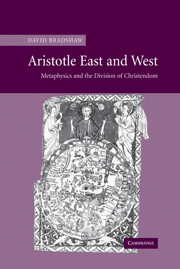Book contents
- Frontmatter
- Contents
- Preface
- 1 The Aristotelian beginnings
- 2 The Prime Mover
- 3 Between Aristotle and Plotinus
- 4 Plotinus and the theory of two acts
- 5 The Plotinian heritage in the West
- 6 Gods, demons, and theurgy
- 7 The formation of the eastern tradition
- 8 The flowering of the eastern tradition
- 9 Palamas and Aquinas
- 10 Epilogue
- Bibliography
- Index
7 - The formation of the eastern tradition
Published online by Cambridge University Press: 22 September 2009
- Frontmatter
- Contents
- Preface
- 1 The Aristotelian beginnings
- 2 The Prime Mover
- 3 Between Aristotle and Plotinus
- 4 Plotinus and the theory of two acts
- 5 The Plotinian heritage in the West
- 6 Gods, demons, and theurgy
- 7 The formation of the eastern tradition
- 8 The flowering of the eastern tradition
- 9 Palamas and Aquinas
- 10 Epilogue
- Bibliography
- Index
Summary
Most of the texts discussed in the previous chapter remained unknown to the West during the Middle Ages. It is not surprising that the magical papyri, Hermetica, and works of Iamblichus and Proclus went untranslated; rather more surprising is that the same is true of the works of Justin Martyr, Athenagoras, Clement, Origen, and Athanasius, with the exception of Origen's De Principiis and some exegetical treatises. All told, of the works we have discussed the only one that played a role in the formative stages of western thought was the New Testament, which of course was available in the Vulgate of Jerome. There we find energeia translated as operatio and energein as operari. Although these renderings were probably the best available, they do not possess the same fluidity of meaning as the original. To think of the divine operationes as forces or active powers that can be shared in by human activity would not normally occur to a Latin reader. This is not only because the major works in which the expansion of meaning took place were not translated into Latin; it is also because operatio does not share the association of energeia with actuality, much less with the fusion of activity and actuality that we have traced in earlier chapters. That is why, when the works of Aristotle were translated in the twelfth and thirteenth centuries, energeia had to be rendered in different contexts by three different terms: operatio, actus, and actualitas.
- Type
- Chapter
- Information
- Aristotle East and WestMetaphysics and the Division of Christendom, pp. 153 - 186Publisher: Cambridge University PressPrint publication year: 2004



